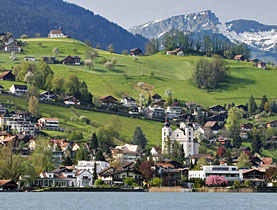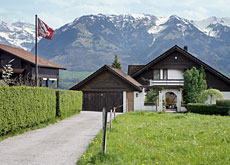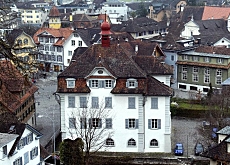Tax paradise to vote on fairer system

Obwalden will decide on Sunday whether to become the first canton to adopt a flat income tax rate after a court ruled its previous degressive model unfair.
Cantons compete with each other to set the lowest tax rates to attract wealthy individuals and companies, a policy that has attracted criticism both within Switzerland and outside its borders.
In January 2006, Obwalden slashed its corporate levy and introduced an income tax scheme that set lower rates for the rich than people on lower incomes. A communist politician took the canton to the Federal Court and won a ruling in June that the model was unconstitutional.
Undeterred by the setback, Obwalden’s authorities have proposed a flat rate that they believe will still lure wealthy foreigners to bask in the canton’s tax breaks.
European neighbours have frequently expressed outrage that their rich citizens are opting to empty their pockets into Swiss coffers rather than their own. But Switzerland has defended its position as providing healthy competition.
Voters will also decide on a proposal to slash corporate tax rates from 6.6 per cent to six per cent next year, the lowest in Switzerland. That could add further fuel to a separate row between Switzerland and the European Union over alleged unfair business competition.
Switzerland has a three-tiered income tax system at federal, cantonal and local community levels. Obwalden is proposing to set a cantonal rate of 1.8 per cent, but the total bill will vary depending on where people are located, as communities levy different charges.
Critic appeased
The new model would also exempt the first SFr10,000 ($87,000) of income from taxation, a move that would benefit those on lower incomes the most. The new system will cost the canton SFr12 million in lost revenues, but its authorities say it can still foot the bill for services.
Deputy finance director Robert Vonwyl told swissinfo that the new model would be more egalitarian but would not hurt the rich too much.
“Compared with 2005, high income earners already pay much less and they would only have to pay a little more from next year. From 2008 those on low incomes will benefit the most from the proposed tax changes,” he said.
Knut Hackbarth, managing director of Obwalden Business Promotion said the court decision to outlaw the degressive system had inadvertently benefitted the canton by drawing attention to its tax haven status.
He added that the tax changes were encouraging people to return to the canton, which had been losing inhabitants hand over fist before new companies arrived to invigorate the economy.
“Everyone appears to be happy with the new solution. Last year we added 500 new inhabitants to our 35,000 population, which is the second fastest growth of any canton,” he told swissinfo.
Even former critics of the Obwalden system, such as Gebhard Kirchgässner, professor at St Gallen University, have been appeased.
“It’s definitely a much fairer system and one that I do not object to. I only hope the authorities there have enough money to pay for services,” he told swissinfo.
swissinfo, Matthew Allen
In December 2005, Obwalden decided to cut corporate tax rates to 6.6% and introduce a degressive income tax rate that favoured the rich.
In the first six months of this year, the canton saw a 230% increase in companies registering to set up shop.
Other cantons have followed suit with tax cuts, but critics, including the centre-left Social Democratic Party, fear the competition could eventually lead to ruin.
Communist politician Josef Zisyadis took the canton to the Federal Court, arguing that Obwalden’s degressive income tax broke a code in the Swiss constitution stating that taxes should be levied according to people’s ability to pay.
The court upheld his objection in June. Since then, Obwalden has operated an emergency tax system that will be replaced by whatever voters decide on Sunday.

In compliance with the JTI standards
More: SWI swissinfo.ch certified by the Journalism Trust Initiative



You can find an overview of ongoing debates with our journalists here . Please join us!
If you want to start a conversation about a topic raised in this article or want to report factual errors, email us at english@swissinfo.ch.